10 National parks that offer free admission
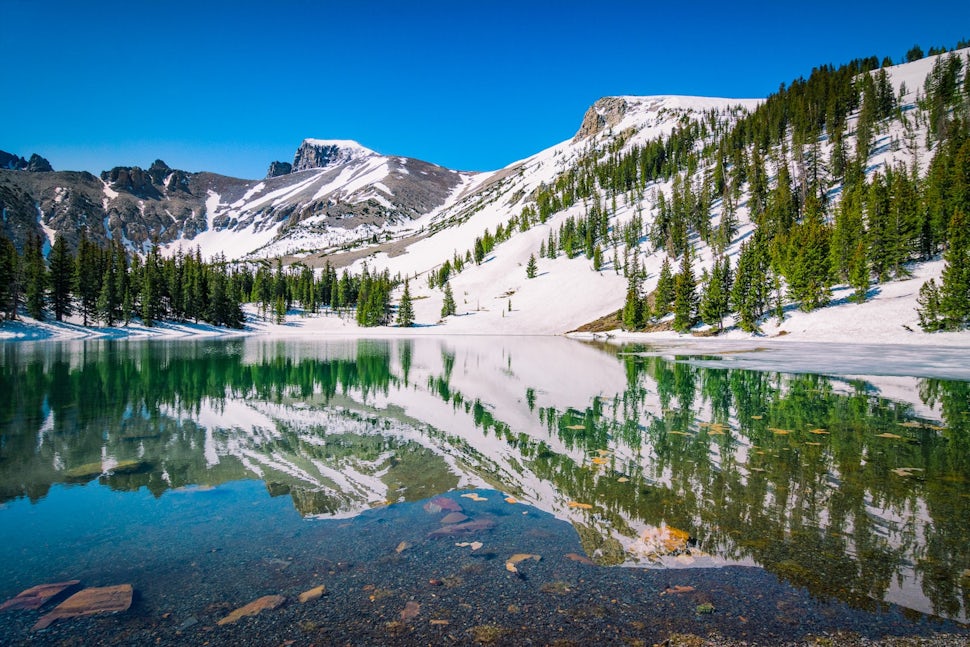
National Parks offer the opportunity for people to see stunning views, hike trails that match their preferred difficulty level, and get out of there heads and into nature. Gaining these benefits without paying an entrance fee is just a bonus! Read on for 10 National Parks with free admission.
Note: Though you can visit the parks mentioned below for free at the time of publication (March 2023), research park destinations ahead of time as there may be additional fees for parking, hiking, biking, or camping.
1. North Cascades National Park– Washington
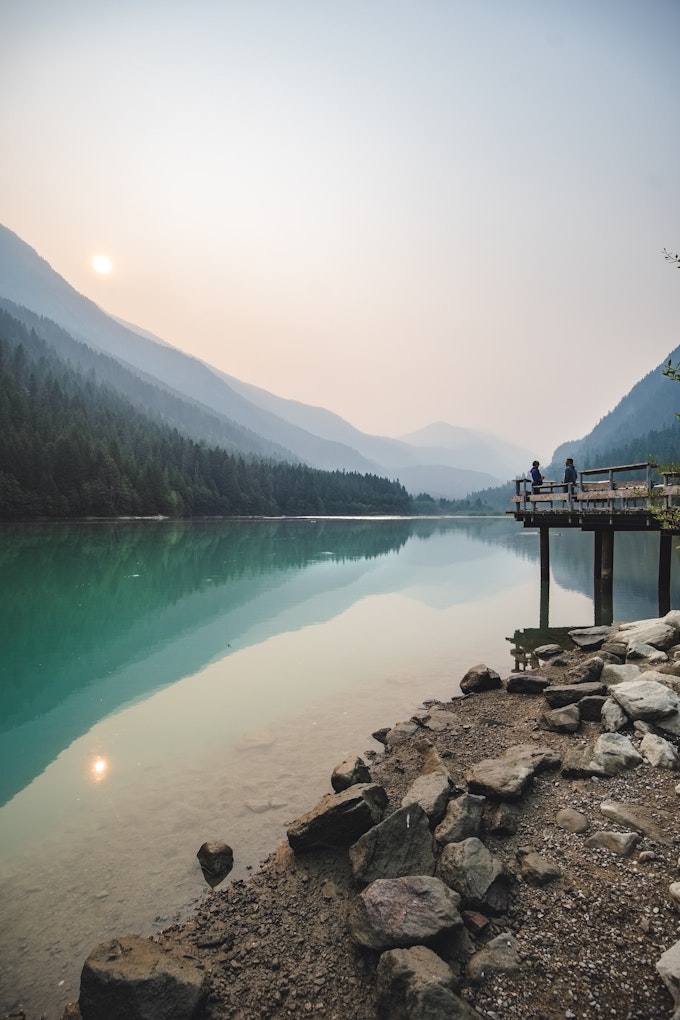
Located in northern Washington, North Cascades National Park is a picturesque place known for its eye-catching alpine wilderness, glaciers, lakes, and conifer forests. A state road runs right through the park, which makes taking in the scenery easy and accessible whether you want to get out and hike or stay comfy in your vehicle. If you’re interested in seeing wildlife, be on the lookout for grizzly bears, gray wolves, and over 200 bird species. Many visitors come to North Cascades National Park for the camping and hiking opportunities.
Favorite adventures:
Explore Diablo Lake - This vista is accessible via car
Hike to Agnes Gorge in Stehekin Valley - 5-mile out-and-back with 300 feet of elevation change
Fourth of July Pass from Thunder Creek - 11.2-mile out-and-back with 2400 feet of elevation change
2. Redwood National Park– California
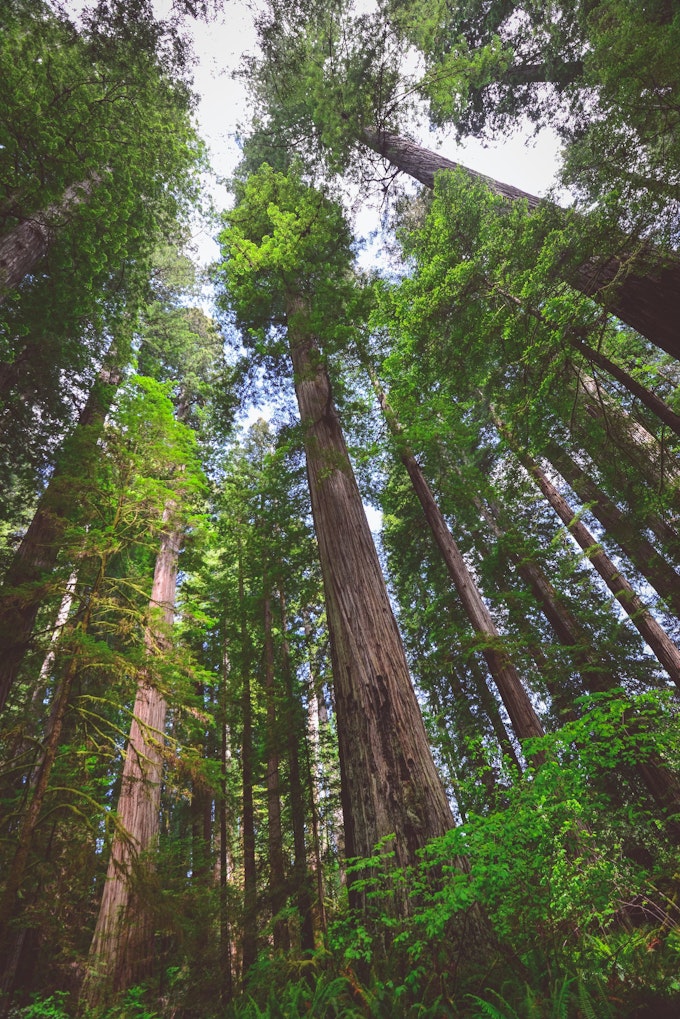
Along northern California’s coast lies Redwood National and State Parks. Roughly half of the world’s old growth redwood trees live here. Aside from marveling at these living monuments, enjoy gorgeous coastal views by taking a scenic drive around the area. Other activities include hiking and camping. Backcountry camping permits are free of cost at nearly every site minus Gold Bluffs Beach.
Favorite adventures:
Explore Stout Grove via the Howland Hill Road - 6-mile scenic drive
Hike to Tall Trees Grove - 3.9-mile loop with 690 feet of elevation change
Hike Emerald Ridge– Redwood Creek Loop - 6-mile loop with 900- feet of elevation change
3. Channel Islands National Park– California
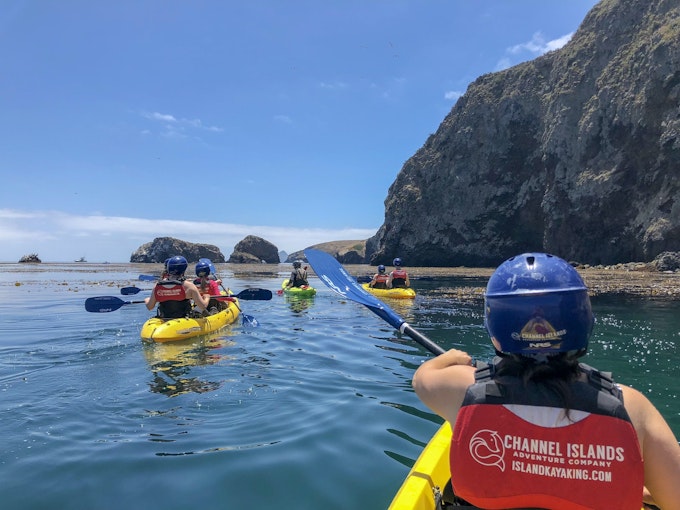
Channel Islands National Park is unique because it includes five islands off the Southern California coast: Santa Barbara, Anacapa, Santa Rosa, Santa Cruz, and San Miguel. From hiking trails to a historic lighthouse to sea caves, historical sites, and seal gatherings, you’re sure to find something that will spark pure joy. Though park entry is free, you will need to pay for a ferry ride to take you to the islands.
The activities on and around these islands go on and on – hiking, camping, swimming, kayaking, birdwatching, diving, snorkeling, fishing, and surfing. Kayak rentals are available on-site! To ensure you can fit in more than one activity, stay overnight at one of the campgrounds (there's one on each island) which are open year-round.
Favorite adventures:
Hike East Anacapa Island - 2-mile loop with minimal elevation change
Kayak Santa Cruz Island - However long you'd like!
Hike the Potato Harbor Trail on Santa Cruz Island - 4.5-mile with 600 feet of elevation change
Hike the Torrey Pines Trail on Santa Rosa Island - 1.6-mile point-to-point with 400 feet of elevation change
4. Great Basin National Park– Nevada
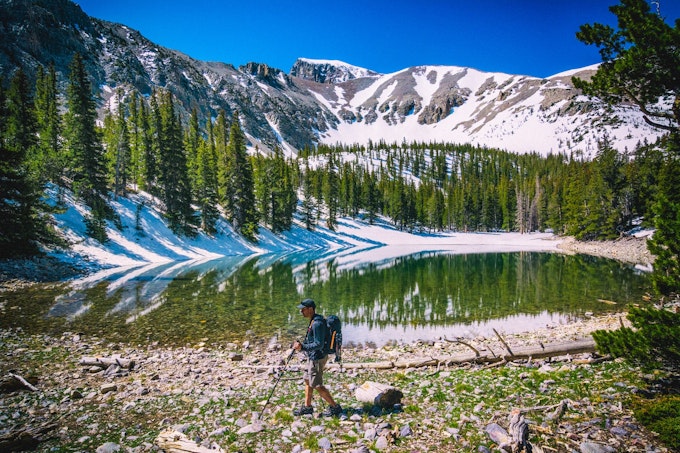
This incredible park is located in Eastern Nevada by the Utah Border. It's home to ancient bristlecone pines and snow-capped mountains. If you’re looking for a surreal wilderness experience, Great Basin National Park boasts some of the darkest skies in the US, making for incredible stargazing and night photography.
While visiting this underrated National Park, you’ll have plenty of opportunities to hike, fish, and stargaze.
Favorite adventures:
Wheeler Peak via Upper Lehman Creek - 15.27-mile out-and-back with 5,177 feet of elevation change
Hike the Bristlecone and Glacier Trail - 4.6-mile out-and-back with 1,100 feet of elevation change
Hike to Baker Peak - 15-mile out-and-back with 4,000 feet of elevation change
Hike the Alpine Lakes Loop - 2.7-mile loop with 600 feet of elevation change
5. Hot Springs National Park– Arkansas
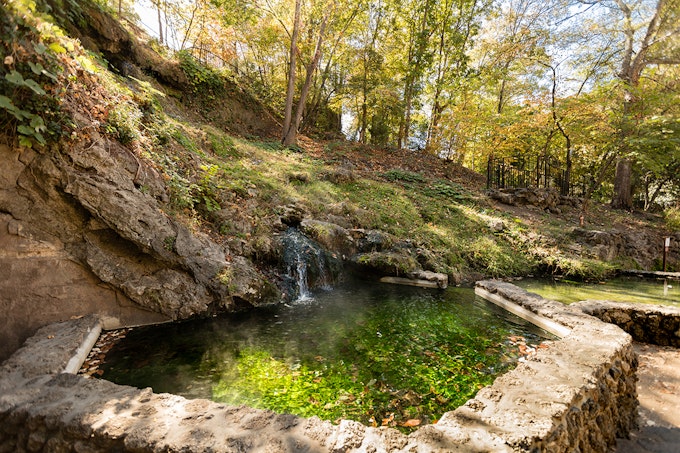
Hot Springs National Park in Central Arkansas features Bathhouse Row, two facilities offering visitors the chance to submerge in natural thermal spring water. The 47 thermal springs in the park are sourced from natural spring water. Though you can't soak in these natural springs, you can touch the thermal water at The Display Spring and Hot Water Cascade. In addition to viewing the springs, take the time to explore over 30 miles of hiking trails while soaking in the mountain views.
Favorite adventure:
Hike Hot Springs Mountain and Soak at Buckstaff Bathhouse - 5-mile loop
6. Great Smoky Mountains National Park– North Carolina and Tennessee
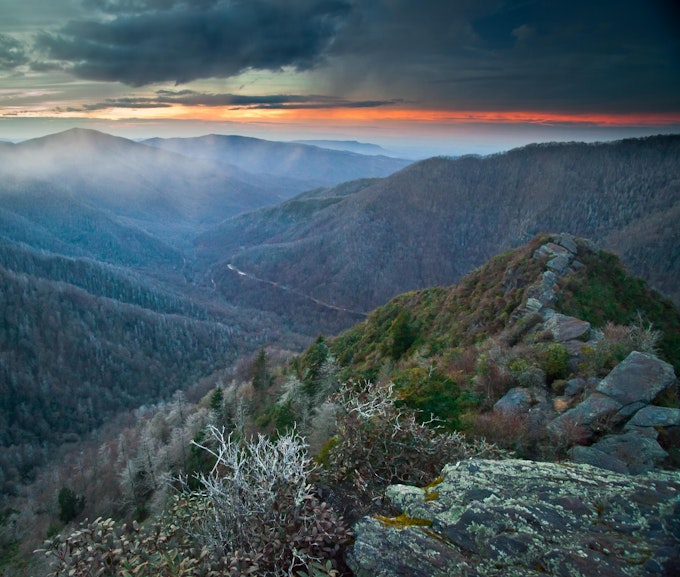
Great Smoky Mountains National Park, on the border of North Carolina and Tennessee, is the most visited of the national parks. The park is free to enter but check for potential parking fees starting in 2023. It features magnificent mountains, iconic wispy fog settled on the mountaintops, lush forests, abundant year-round wildflowers, waterfalls, streams, and rivers.
It’s also known for its unique historic log buildings. Choose from activities like hiking, camping, fishing, and horseback riding to get to know this area. You can read more here to find places in and near the park to adventure and dine.
Favorite adventures:
Hike the Chimney Tops - 4.03-mile out-and-back with 1,487 feet of elevation change
Camp at Mt. LeConte Lodge via Alum Cave - 9.96-mile out-and-back
Explore Cataloochee Valley - However long you want to meander
Roaring Fork Motor Nature Trail - 5.83-mile point-to-point
Hike the Cucumber Gap and Little River Loop - 5.5-mile loop with 800 feet of elevation change
7. Congaree National Park– South Carolina
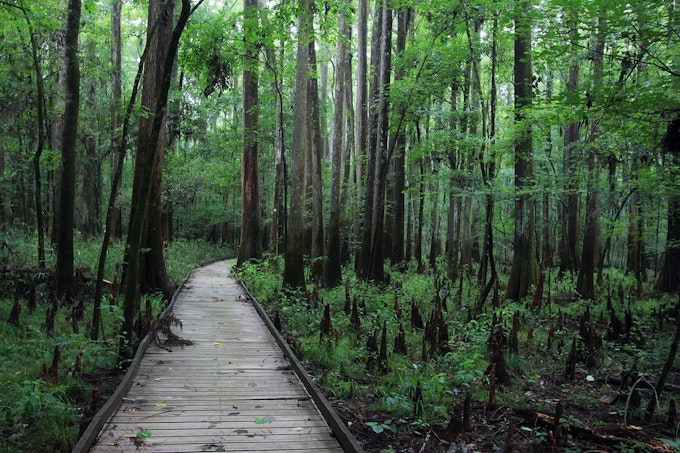
Situated in central South Carolina, Congaree National Park is otherworldly. It’s mostly swamp and forest landscape adorned with ancient trees creates a unique ecosystem. Here, you’ll have the opportunity to spot river otters, turtles, birds, deer, and even alligators! Visitors can explore Congaree on foot or on the water. In addition to the approximately 25 miles of hiking trails and 2.4 miles of boardwalk, you can canoe or kayak to see the park from new angles.
Favorite adventures:
Kayak Cedar Creek - However long you'd like
Boardwalk Loop - 2.5 mile loop with minimal elevation change
Hike the Weston Lake Trail - 4.5-mile loop with minimal elevation change
8. Gates of the Arctic National Park– Alaska
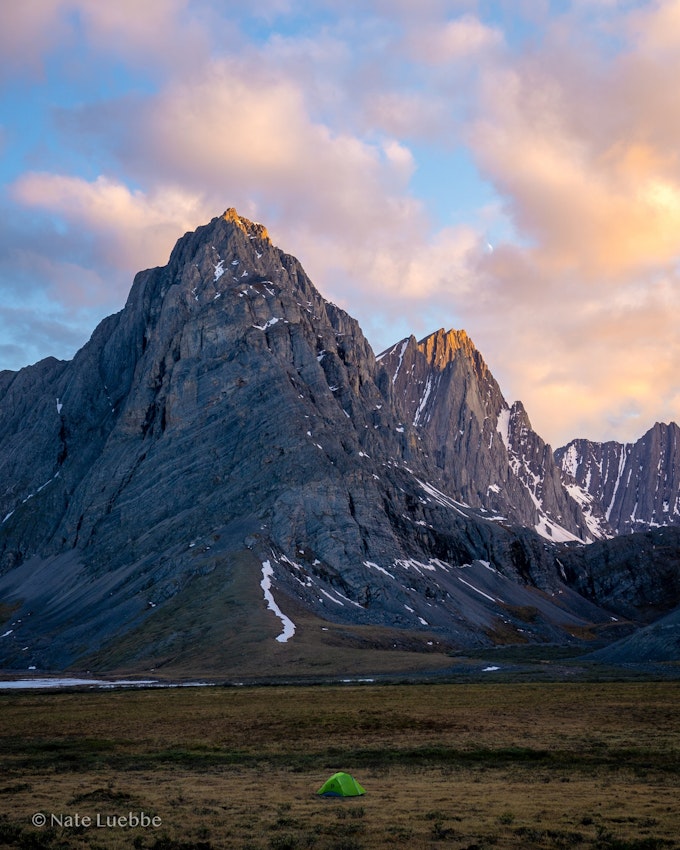
In Northern Alaska, Gates of the Arctic National Park is the ultimate remote wilderness destination. The park protects parts of the Brooks Range and is only accessible by bush plane! When you arrive, don’t be alarmed that no roads or trails exist. The Arctic tundra terrain is relatively untouched and free of tourists and infrastructure.
Because it’s such a remote spot, it’s one of the least visited National Parks. With that said, it’s essential to know your limits. In a place with no marked trails, many visitors rely on guides to lead the way. Those on self-supported adventures must have extremely established navigation and survival skills.
Make the most of your trip to Gates of the Arctic National Park by hiking, admiring the scenery, and exploring the rivers, lakes, and camping areas.
Favorite adventures:
Backpack Gates of the Arctic National Park - 25-mile point-to-point hike with 2,000 feet of elevation gain
9. Wrangell-St. Elias National Park– Alaska
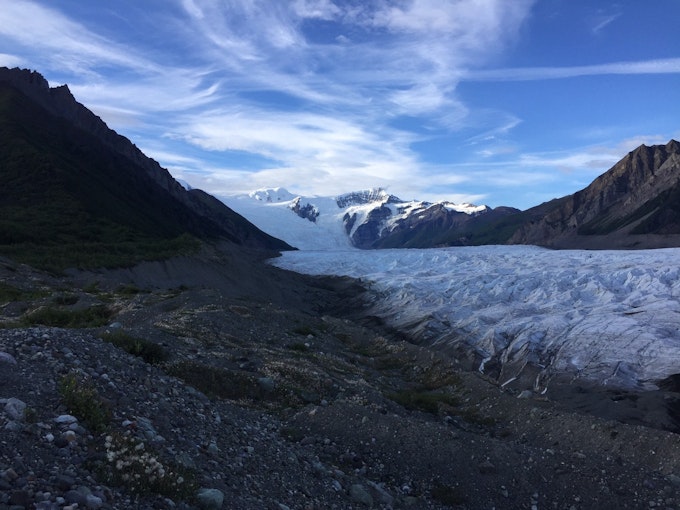
Located in South Central Alaska, Wrangell-St. Elias National Park is the biggest national park in the country, spanning roughly 13 million acres! This rugged landscape contains a few of the largest volcanoes and has the greatest concentration of glaciers in North America.
It’ll be hard not to be ‘wowed’ while exploring this spectacular expanse of raw nature. Check out the ghost towns for an added mysterious adventure! This Alaskan treasure offers many hiking opportunities, and with seven of the 20 highest peaks in North America, it’s also a mountaineering paradise!
Favorite adventures:
Backpack to Stairway Icefall - 14.4 mile out-and-back with 2,305 feet of elevation change
Hike to Kennecott’s Ice Caves - 4-mile loop with 500 feet of elevation change
Explore the Kennecott Mines - 1-mile out-and-back with 100 feet of elevation change
10. New River Gorge National Park– West Virginia
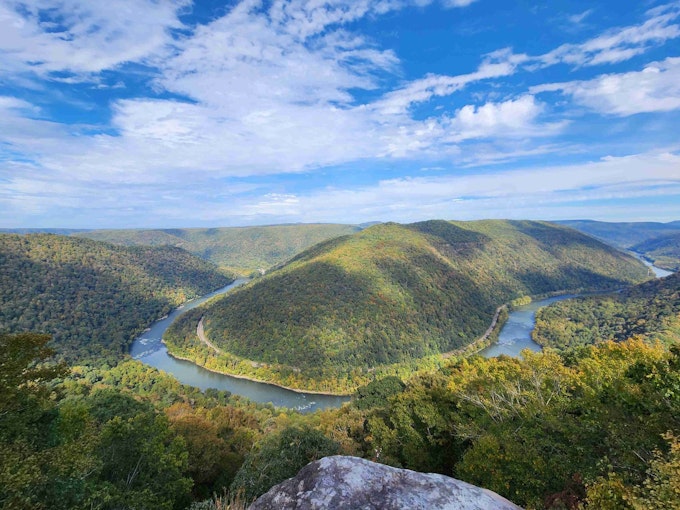
New River Gorge National Park in Southern West Virginia spans over 73,808 acres in the Appalachian Mountains. The area was deemed a national park in 2020, making it the newest in the U.S.! The New River Gorge is the longest and deepest gorge in the Appalachians.
You can hike, bike, camp, fish, and boulder here. Rock climbers will love the access to over 1400 established climbs in the area, making it one of the most famous climbing spots in the country. Whitewater rafters can enjoy the Class III to Class V rapids at the Lower Gorge.
Favorite adventures:
Grandview Overlook in the New River Gorge - 0.1-mile out-and-back with minimal elevation gain
Sandstone Falls - 0.52-mile out-and-back with 46 feet of elevation gain
Cover photo: Mayson
We want to acknowledge and thank the past, present, and future generations of all Native Nations and Indigenous Peoples whose ancestral lands we travel, explore, and play on. Always practice Leave No Trace ethics on your adventures and follow local regulations. Please explore responsibly!
Do you love the outdoors?
Yep, us too. That's why we send you the best local adventures, stories, and expert advice, right to your inbox.








